【英语】云南德宏州芒市第一中学2014-2015学年高一上学期期中考试
- 格式:doc
- 大小:247.50 KB
- 文档页数:9
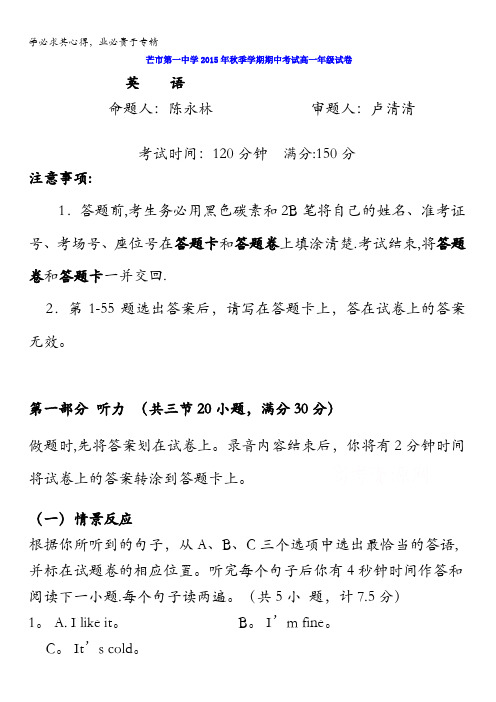
芒市第一中学2015年秋季学期期中考试高一年级试卷英语命题人:陈永林审题人:卢清清考试时间:120分钟满分:150分注意事项:1.答题前,考生务必用黑色碳素和2B笔将自己的姓名、准考证号、考场号、座位号在答题卡和答题卷上填涂清楚.考试结束,将答题卷和答题卡一并交回.2.第1-55题选出答案后,请写在答题卡上,答在试卷上的答案无效。
第一部分听力(共三节20小题,满分30分)做题时,先将答案划在试卷上。
录音内容结束后,你将有2分钟时间将试卷上的答案转涂到答题卡上。
(一)情景反应根据你所听到的句子,从A、B、C三个选项中选出最恰当的答语,并标在试题卷的相应位置。
听完每个句子后你有4秒钟时间作答和阅读下一小题.每个句子读两遍。
(共5小题,计7.5分)1。
A. I like it。
B。
I’m fine。
C。
It’s cold。
2。
A。
Red。
B。
Size M.C. It’s too big。
3。
A。
Yes, I prefer soccer。
B. No, I don't.C。
I prefer soccer.4. A。
Sorry, I won't. B. I’ll do it right away。
C. Please do。
5。
A. Yes, I know。
B。
Thank you。
C. That’s OK。
(二)对话理解第一节:听5段小对话,每段对话后有一个小题,从A、B、C三个选项中选出最佳答语,并标在试题卷的相应位置.听完每段对话后,你有5秒钟时间作答和阅读下一小题。
每段对话读两遍。
(共5小题,计7.5分)6. What would the woman like to drink?A。
Tea。
B. Coffee. C。
Water。
7. What time will the two speakers meet?A。
10:30. B。
10:00。
C.9:30.8。
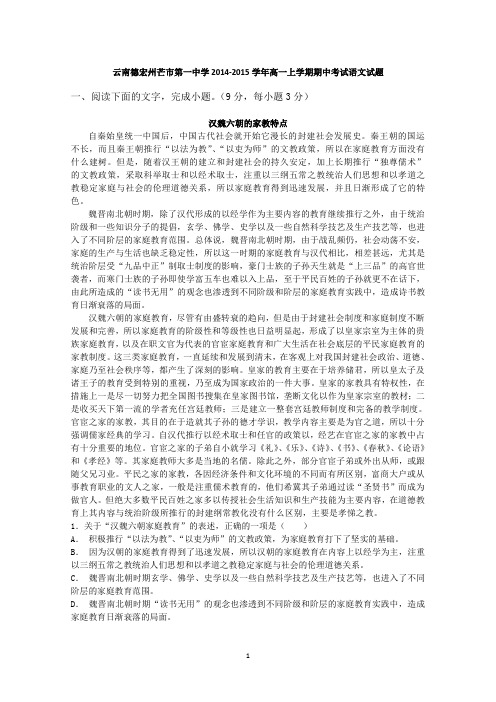
云南德宏州芒市第一中学2014-2015学年高一上学期期中考试语文试题一、阅读下面的文字,完成小题。
(9分,每小题3分)汉魏六朝的家教特点自秦始皇统一中国后,中国古代社会就开始它漫长的封建社会发展史。
秦王朝的国运不长,而且秦王朝推行“以法为教”、“以吏为师”的文教政策,所以在家庭教育方面没有什么建树。
但是,随着汉王朝的建立和封建社会的持久安定,加上长期推行“独尊儒术”的文教政策,采取科举取士和以经术取士,注重以三纲五常之教统治人们思想和以孝道之教稳定家庭与社会的伦理道德关系,所以家庭教育得到迅速发展,并且日渐形成了它的特色。
魏晋南北朝时期,除了汉代形成的以经学作为主要内容的教育继续推行之外,由于统治阶级和一些知识分子的提倡,玄学、佛学、史学以及一些自然科学技艺及生产技艺等,也进入了不同阶层的家庭教育范围。
总体说,魏晋南北朝时期,由于战乱频仍,社会动荡不安,家庭的生产与生活也缺乏稳定性,所以这一时期的家庭教育与汉代相比,相差甚远,尤其是统治阶层受“九品中正”制取士制度的影响,豪门士族的子孙天生就是“上三品”的高官世袭者,而寒门士族的子孙即使学富五车也难以入上品,至于平民百姓的子孙就更不在话下,由此所造成的“读书无用”的观念也渗透到不同阶级和阶层的家庭教育实践中,造成诗书教育日渐衰落的局面。
汉魏六朝的家庭教育,尽管有由盛转衰的趋向,但是由于封建社会制度和家庭制度不断发展和完善,所以家庭教育的阶级性和等级性也日益明显起,形成了以皇家宗室为主体的贵族家庭教育,以及在职文官为代表的官宦家庭教育和广大生活在社会底层的平民家庭教育的家教制度。
这三类家庭教育,一直延续和发展到清末,在客观上对我国封建社会政治、道德、家庭乃至社会秩序等,都产生了深刻的影响。
皇家的教育主要在于培养储君,所以皇太子及诸王子的教育受到特别的重视,乃至成为国家政治的一件大事。
皇家的家教具有特权性,在措施上一是尽一切努力把全国图书搜集在皇家图书馆,垄断文化以作为皇家宗室的教材;二是收买天下第一流的学者充任宫廷教师;三是建立一整套宫廷教师制度和完备的教学制度。
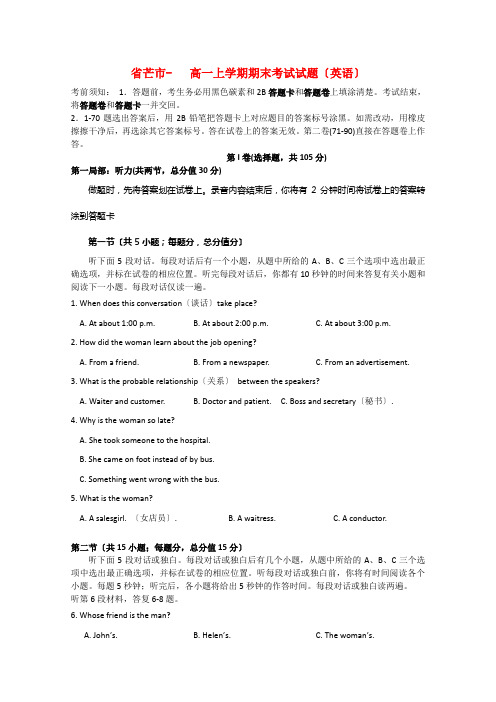
省芒市- 高一上学期期末考试试题〔英语〕考前须知:1.答题前,考生务必用黑色碳素和2B答题卡和答题卷上填涂清楚。
考试结束,将答题卷和答题卡一并交回。
2.1-70题选出答案后,用2B铅笔把答题卡上对应题目的答案标号涂黑。
如需改动,用橡皮擦擦干净后,再选涂其它答案标号。
答在试卷上的答案无效。
第二卷(71-90)直接在答题卷上作答。
第I卷(选择题,共105分)第一局部:听力(共两节,总分值30分)做题时,先将答案划在试卷上。
录音内容结束后,你将有2分钟时间将试卷上的答案转涂到答题卡第一节〔共5小题;每题分,总分值分〕听下面5段对话。
每段对话后有一个小题,从题中所给的A、B、C三个选项中选出最正确选项,并标在试卷的相应位置。
听完每段对话后,你都有10秒钟的时间来答复有关小题和阅读下一小题。
每段对话仅读一遍。
1. When does this conversation〔谈话〕take place?A. At about 1:00 p.m.B. At about 2:00 p.m.C. At about 3:00 p.m.2. How did the woman learn about the job opening?A. From a friend.B. From a newspaper.C. From an advertisement.3. What is the probable relationship〔关系〕between the speakers?A. Waiter and customer.B. Doctor and patient.C. Boss and secretary〔秘书〕.4. Why is the woman so late?A. She took someone to the hospital.B. She came on foot instead of by bus.C. Something went wrong with the bus.5. What is the woman?A. A salesgirl. 〔女店员〕.B. A waitress.C. A conductor.第二节〔共15小题;每题分,总分值15分〕听下面5段对话或独白。
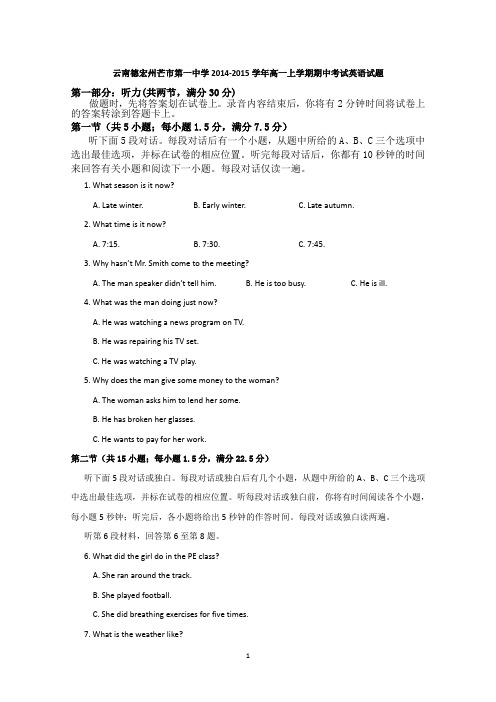
云南德宏州芒市第一中学2014-2015学年高一上学期期中考试英语试题第一部分:听力(共两节,满分30分)做题时,先将答案划在试卷上。
录音内容结束后,你将有2分钟时间将试卷上的答案转涂到答题卡上。
第一节(共5小题;每小题1.5分,满分7.5分)听下面5段对话。
每段对话后有一个小题,从题中所给的A、B、C三个选项中选出最佳选项,并标在试卷的相应位置。
听完每段对话后,你都有10秒钟的时间来回答有关小题和阅读下一小题。
每段对话仅读一遍。
1. What season is it now?A. Late winter.B. Early winter.C. Late autumn.2. What time is it now?A. 7:15.B. 7:30.C. 7:45.3. Why hasn’t Mr. Smith come to the meeting?A. The man speaker didn’t tell him.B. He is too busy.C. He is ill.4. What was the man doing just now?A. He was watching a news program on TV.B. He was repairing his TV set.C. He was watching a TV play.5. Why does the man give some money to the woman?A. The woman asks him to lend her some.B. He has broken her glasses.C. He wants to pay for her work.第二节(共15小题;每小题1.5分,满分22.5分)听下面5段对话或独白。
每段对话或独白后有几个小题,从题中所给的A、B、C三个选项中选出最佳选项,并标在试卷的相应位置。

芒市第一中学2015—2016 学年度秋期学期期末考试高一年级英语试卷制卷人:禄睿审卷人:张华考试时间:120 分钟总分:150 分第1 卷注意事项:1。
答题前,考生在答题卡上务必用直径0。
5 毫米黑色墨水签字笔将自己的姓名、准考证号填写清楚。
请认真核准准考证号、姓名和科目。
2. 每小题选出答案后,用2B 铅笔把答题卡上对应题目的答案标号涂黑, 如需改动,用橡皮擦干净后,再选涂其他答案标号,在试题卷上作答无效。
第一部分听力(共20 小题;每小题1。
5 分, 满分30 分)第一节(共5 小题;每小题1。
5 分,满分7。
5 分)听下面5 段对话.每段对话后有一个小题, 从题中所给的A、B、C 三个选项中选出最佳选项,并标在试卷的相应位置.听完每段对话后,你都有10 秒钟的时间来回答有关小题和阅读下一小题。
每段对话仅读一遍。
1。
What does the man say about the TV drama?A。
It's too long.B. It’s not interesting.C。
There are lots of ads。
2. When will Bob get to Amy’s house?A。
At 11:20. B。
At 10:20. C。
At 10:00。
3。
What kind of music does the man like?A。
Jazz. B. Rock. C。
Opera。
4. Where will the speakers go?A。
To the seaside.B。
To a playground.C。
To a swimming pool。
5。
How old is the woman now?A. Sixteen years old。
B。
Fifteen years old。
C。
Eleven years old.第二节听下面5段对话或独白.每段对话或独白后有几个小题,从题中所给的A、B、C三个选项中选出最佳选项,并标在试卷的相应位置。
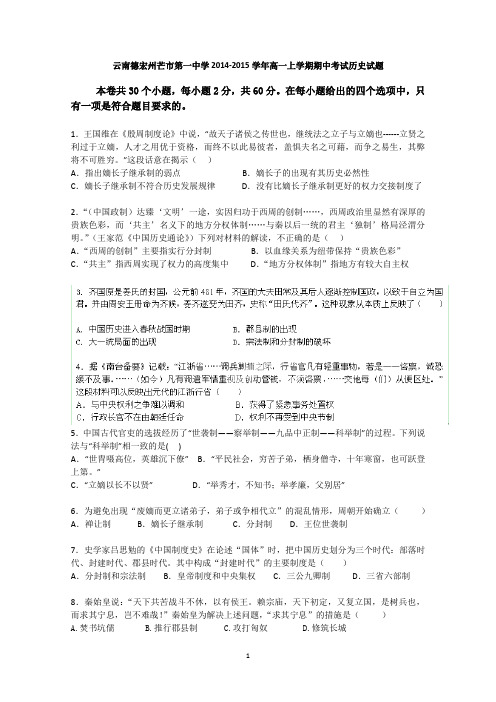
云南德宏州芒市第一中学2014-2015学年高一上学期期中考试历史试题本卷共30个小题,每小题2分,共60分。
在每小题给出的四个选项中,只有一项是符合题目要求的。
1.王国维在《殷周制度论》中说,“故天子诸侯之传世也,继统法之立子与立嫡也------立贤之利过于立嫡,人才之用优于资格,而终不以此易彼者,盖惧夫名之可藉,而争之易生,其弊将不可胜穷。
”这段话意在揭示()A.指出嫡长子继承制的弱点B.嫡长子的出现有其历史必然性C.嫡长子继承制不符合历史发展规律D.没有比嫡长子继承制更好的权力交接制度了2.“(中国政制)达臻‘文明’一途,实因归功于西周的创制……,西周政治里显然有深厚的贵族色彩,而‘共主’名义下的地方分权体制……与秦以后一统的君主‘独制’格局泾渭分明。
”(王家范《中国历史通论》)下列对材料的解读,不正确的是()A.“西周的创制”主要指实行分封制B.以血缘关系为纽带保持“贵族色彩”C.“共主”指西周实现了权力的高度集中D.“地方分权体制”指地方有较大自主权5.中国古代官吏的选拔经历了“世袭制——察举制——九品中正制——科举制”的过程。
下列说法与“科举制”相一致的是( )A.“世胄嗫高位,英雄沉下僚”B.“平民社会,穷苦子弟,栖身僧寺,十年寒窗,也可跃登上第。
”C.“立嫡以长不以贤” D.“举秀才,不知书;举孝廉,父别居”6.为避免出现“废嫡而更立诸弟子,弟子或争相代立”的混乱情形,周朝开始确立()A.禅让制B.嫡长子继承制C.分封制D.王位世袭制7.史学家吕思勉的《中国制度史》在论述“国体”时,把中国历史划分为三个时代:部落时代、封建时代、郡县时代。
其中构成“封建时代”的主要制度是()A.分封制和宗法制B.皇帝制度和中央集权C.三公九卿制D.三省六部制8.秦始皇说:“天下共苦战斗不休,以有侯王。
赖宗庙,天下初定,又复立国,是树兵也,而求其宁息,岂不难哉!”秦始皇为解决上述问题,“求其宁息”的措施是()A.焚书坑儒B.推行郡县制C.攻打匈奴D.修筑长城9.唐代文学家柳宗元说:“周之失,在于制;秦之失,在于政,不在制”。
芒市第一中学2015年春季学期期中考试高一年级试卷英语第I卷(选择题,共90分)第一部分:听力(共两节,满分30分)做题时,先将答案划在试卷上。
录音内容结束后,你将有2分钟时间将试卷上的答案转涂到答题卡上。
第一节(共5小题;每小题1.5分,满分7.5分)听下面5段对话。
每段对话后有一个小题,从题中所给的A、B、C三个选项中选出最佳选项,并标在试卷的相应位置。
听完每段对话后,你都有10秒钟的时间来回答有关小题和阅读下一小题。
每段对话仅读一遍。
第一节(共5小题,每题1.5分,共7.5分)请听下面5段对话,选出最佳答案。
1. What is the man probably doing?A. Walking in a park.B. Working on his work report.C. Working overtime in the office.2. Whose birthday is it today?A. Alice’s.B. Mike’s.C. Mary’s.3. What’s the most probable relationship between the two speakers?A. Teacher and student.B. Father and daughter.C. Husband and wife.4. When is Lisa’s wedding?A. On July 18.B. On July 19.C. On July 20.5. What does the man dream of becoming?A. A fashion designer.B. A famous actor.C. A talk show host.第二节(共15小题;每小题1.5分,满分22.5分)听下面5段对话或独白。
每段对话或独白后有几个小题,从题中所给的A、B、C三个选项中选出最佳选项,并标在试卷的相应位置。
芒市第一中学2016年秋季学期高一年级期中考试试卷英语第I卷 (选择题,共80分)第一部分:听力(共两节,满分30分)做题时,先将答案划在试卷上。
录音内容结束后,你将有2分钟时间将试卷上的答案转涂到答题卡上。
第一节(共5小题;每小题1.5分,满分7.5分)听对话。
每段对话后有一个小题,从题中所给的A、B、C三个选项中选出最佳选项。
注意:每段对话仅读一遍。
1. What does Bob’s mother do?A. A doctorB. A driverC. A teacher2. What are the man and the woman talking about?A. The foodB. The weatherC. The hobby3. What will the man do?A. Visit the womanB. Wait for a phone callC. Go to the hospital4. Where does the conversation take place?A. In a bookstoreB. In a classroomC. In a restaurant5. Why doesn’t Mary eat her candies?A. She doesn’t like candies.B. Something is wrong with her tooth.C. She has no tooth.第二节(共15小题;每小题1.5分,满分22.5分)听对话或独白。
每段对话或独白后有几个小题,从题中所给的A、B、C三个选项中选出最佳选项。
注意:每段对话或独白读两遍。
听第6段材料,回答第6至第8题。
6. How far is the History Museum?A. 4kmB. 5kmC. 6km7. How will the man go to the museum?A. By bikeB. On footC. By bus8. When does the museum open in the morning?A. At 8:00B. At 8:30C. At 9:00听第7段材料,回答第9至第11题。
云南省德宏州芒市2012-2013学年高一英语上学期期中考试试题新人教版第I卷(第1-80小题,共110分)第一部分听力(共二节, 满分30分)第一节:(共5小题;每小题1.5分,满分7.5分)听下面5段对话。
每段对话后有一个小题,从题中所给的A、B、C三个选项中选出最佳选项,并标在试卷的相应位置。
听完每段对话后,你都有10秒钟的时间来回答有关小题和阅读下一小题。
每段对话仅读一遍。
1.When does the conversation take place?A.On Christmas DayB.On New Year’s DayC.On Thanksgiving2.Where is Miss Zhao?A.In the classroom.B.In the reading room.C.In the computer room.3.Who is using the bike now?A.MikeB.SamC.Linda4.How did the woman get the cookies?A.She made them.B.She bought them.C.The man gave them to her.5.What did the man do last weekend?A.He went to see his sister.B.He went to London.C.He stayed at home.第二节 (共15小题;每小题1.5分,满分22.5分)听下面5段对话或独白。
每段对话或独白后有几个小题,从题中所给的A、B、C三个选项中选出最佳选项,并标在试卷的相应位置。
听每段对话或独白前,你将有时间阅读各个小题,每小题5秒钟;听完后,各小题将给出5秒钟的作答时间。
每段对话或独白读两遍。
听第6段材料,回答第6至7题。
6.Who is Tony?A.The woman’s brother.B.The woman’s husband.C.The woman’s son.7.What kid of problem does the woman have?A.She doesn’t earn enough.B.She lost money.C.She lost her job.听第7段材料,回答第8至9题。
云南德宏州芒市第一中学高中英语 unit2 Enlish period2 reading学案新人教版必修12. Teaching ProceduresStep1. Check homework (全优设计基础导练部分的第一二大题)Step2 Pre-readingDiscuss the two questions with partners a nd then answer them.1. How many people speak English in the world today?2. Why do so many people speak English?Step3.ReadingTask 1 Scanning:Please write down the main idea of each paragraph.Para. 1:The of the English language in the world.Para. 2:Native speaker can each other but they may not be able to .Para. 3-4:All language change when with one a nother.Para. 5:English is spoken as a language or language in and .Task 2 SkimmingFill in the blanks with proper words according to the text.The English between AD 450 and 1150 was based more on _____.From AD 800 to 1150, those who ruled England spoke first and later .In 1620 some British settlers moved to. In the 18th century, some British people were taken to ______. English began to be spoken in both countries.English is also spoken as a foreign or language in many other countries in Africa and .Today, the number of people learning English in China is increasing . As a matter of fact,China may have the number of English learners.Task 3 Careful reading:1. Read the p assage carefully and finish the exercise1 on page 10.2. Read the material carefully and discuss with your partners to answer the following questions.A. How did English develop to modern English?B.Why English changed all the way?C.What other Englishes developed from the old English?Step4. Post readingDiscussion1.Some people say that Chinese is a much more elegant language, so it is more important for us to master it and it is not so necessary to master foreign language. Do you agree with this opinion and why?2. Finish the exercise on Page 4, number 2 and3.Step6. Summary: Let’s review the history of En glish language.Step7. Homework1.Please read this passage loudly again and recite the underlined phrases and sentences duringour class.2.Retell the story yourself in the first person and write it down on your exercise book.3.Recite the small summary of the text in the seventh part of the training session of the exercisebook QUANYOU SHEJI. (For the top students to recite, for the rest to read fluently.)4.Prepare for the grammar lesson and have a general idea of the direct and indirect speech: requestand command.Training sessions:Elementary exercises (group A) on pageⅠ.根据括号内汉语或首字母提示,用合适的单词填空1.Although I know that he is not perfect,I do (实际上)like the person.2.We’re going to make a (航行)from Qingdao to Dalian during the summer holiday.3.Mr Smith (逐渐)got much experience from his teaching.4.You should read more to enlarge your (词汇量).5.It is reported that the (身份)of the murderer has been discovered.6.Of the two possibilities,the former seems more likely,and the l is never possible.7.He is a foreigner,but he speaks English like a n speaker.8.English and French are Canada’s o languages,and many Canadians can speak both of them. 9.American English and British English are different in pronunciation and s . 10.He speaks English so f that he can communicate with the native speakers freely.Ⅱ.请用下面方框中所给短语的正确形式填空because of come up at present make use of such as be based on play a part in the number of1.All of us making the earth a better place to live on.2.Today people learning Chinese is increasing.3.The prices of vegetables have been very high recently the dry weather in some4.Most Americans like eating fast food, hamburgers and French fries.5.I hope the plan which is being carried out in our city will bring us a good result.6.The TV play,which a detective novel,is very popular with young people.7.When the thief saw a policeman to him,he ran away quickly.8.Scientists are developing new ways to the solar energy more effectively.Ⅲ.介副词填空1. the end of the show,the audience began standing up and cheering.2.People go to the cinema because they want to see something different everyday life.3.As languages develop,the meaning of words can change time.e to the fire,and you will feel much warmer.5.They must have finished the work now!6.She became the first woman to enter the school but withdrew after a few days because stress.7.I am quite free present if you want me to help you.8.She always bases her opinions facts.9.Who knows what other use can be made this unusual bamboo?10.A lot of questions came at the meeting,which made things more complicated.Consolidation exercises (group B)Ⅳ.完成句子1.Tom is (不仅仅) my neighbour.He is a close friend of mine as well.2.Allow children the space to voice their opinions, (即使)they are different from your own.3.Drunk drivi ng,which was once a (frequently) occurrence,is now under control.4.A great many new ideas (出现)at this education meeting to improve the students’ study.5.Oprah,the queen of American daytime talk TV, (被认为是)one of the most powerful women in the world.6.Some people think that their jobs should (base) on their own interest.7.The English teacher said that every possible use should (make)of our spare time to improve our spoken English.8.In the good care of the nurses,the boy is (gradual) recovering from his heart operation.9.Li Ming told me that he was interested in many sports,(比如)swimming,shooting,skating and so on.10.In China, (许多) graduates go abroad to have a further study every year.Ⅴ.用所给动词的适当形式填空ter in the 17th century,English began (speak)in many other countries.2.As we know,English (change)over time.3.The English in 1150 was different from the English (speak)today.4.The invaders tried hard (conquer)the native people,but in vain.5.Today t he number of people (learn)English is increasing rapidly.6.As a winner,Tom (present)with a gold cup.7.By the time the police arrived,the thief (run)away.8.Some foreigners enjoy (eat)with chopsticks.Enhancement exercise(group C )Ⅶ.阅读理解There are many differences between British English and American English.I used to teach a course about the differences between the two.We speak English on both sides of the A tlantic Ocean but we have many differences in our common language.We have examples of the same words having very different meanings,differing spellings of the same words as well as completely different words for the same things.Here are some examples.A cookie in the US is called a biscuit in the UK.A biscuit in the US is a small cake in the UK.Crisps in the UK,are known as chips,but we British people eat a plate of chips that you call fries in the US.In the UK,a pie can be made from either meat or fruit,while in the US pies are normally made from fruit;pot pies are made from meat.Most things are measured in grams and kilograms in the US,not pounds and ounces.One very obvious difference is the side of the road we each choose to drive on.Petrol in the UK is gas in the US.The place where we fill up our cars,in the UK,is a garage;while in the US,it’s a gas station.The term garage is also used as a place to store your car next to or close by your house.In the UK we call a lorry what is known as a truck in the US.An elevator in the US is called a lift here,and the first floor in the US,is called the ground floor here.So many visitors get off on the wrong floor in British ho tels.I could continue with this.There are countless examples of differences within our one shared language.With so many differences,no wonder it’s hard to understand each other well.1.The passage is mainly about the differences between British English and American English in .A.vocabularyB.grammarC.soundD.spelling2.It’s implied in the passage that the author may be .A.a driver from the USB.a cook from the USC.a teacher from the UKD.a gas station worker from the UK3.In the author’s opinion,.nguage differences don’t affect understandingB.the same words in the two different types of English may have different spellingsC.there will be fewer differences between American and British English in the futureD.it is impossible that some Americ ans get off on the wrong floor in British hotels4.What can we learn from the passage?A.“Elevator” is commonly used in the UK.B.Pies mean the same thing in the UK and the US.C.In the UK,things are measured in pounds and ounces.D.British and American people drive on the same side of the road.。
云南德宏州芒市第一中学2014-2015学年高一上学期期中考试英语试题第一部分:听力(共两节,满分30分)做题时,先将答案划在试卷上。
录音内容结束后,你将有2分钟时间将试卷上的答案转涂到答题卡上。
第一节(共5小题;每小题1.5分,满分7.5分)听下面5段对话。
每段对话后有一个小题,从题中所给的A、B、C三个选项中选出最佳选项,并标在试卷的相应位置。
听完每段对话后,你都有10秒钟的时间来回答有关小题和阅读下一小题。
每段对话仅读一遍。
1. What season is it now?A. Late winter.B. Early winter.C. Late autumn.2. What time is it now?A. 7:15.B. 7:30.C. 7:45.3. Why hasn’t Mr. Smith come to the meeting?A. The man speaker didn’t tell him.B. He is too busy.C. He is ill.4. What was the man doing just now?A. He was watching a news program on TV.B. He was repairing his TV set.C. He was watching a TV play.5. Why does the man give some money to the woman?A. The woman asks him to lend her some.B. He has broken her glasses.C. He wants to pay for her work.第二节(共15小题;每小题1.5分,满分22.5分)听下面5段对话或独白。
每段对话或独白后有几个小题,从题中所给的A、B、C三个选项中选出最佳选项,并标在试卷的相应位置。
听每段对话或独白前,你将有时间阅读各个小题,每小题5秒钟;听完后,各小题将给出5秒钟的作答时间。
每段对话或独白读两遍。
听第6段材料,回答第6至第8题。
6. What did the girl do in the PE class?A. She ran around the track.B. She played football.C. She did breathing exercises for five times.7. What is the weather like?A. It is windy.B. It is cloudy.C. It is sunny.8. What does the girl buy for her classmate?A. A bottle of how water.B. A bottle of orange juice.C. A bottle of iced water.听第7段材料,回答第9至第11题。
9. How will the man go to Guilin?A. By air.B. By train.C. By bus.10. What will the woman do?A. Go traveling with the man.B. Have a good rest at home.C. Help the man with his work.11. What is the probable relationship between the speakers?A. Husband and wife.B. Mother and son.C. Workmates.听第8段材料,回答第12至第14题。
12. What does the conversation take place?A. In the morning.B. In the afternoon.C. In the evening.13. What will the man most probably(可能地)do?A. Go on waiting in line.B. Look for a place to rest.C. Give up what he’s doing.14. What can we know from the conversation?A. The woman has waited for one and a half hours.B. The ticket office will close in two hours.C. The man came here before lunch.听第9段材料,回答第15至第17题。
15. What could the woman always do when she was a child?A. Swim in lakes.B. Skate in gyms.C. Play in the snow.16. What will the weather be like in the afternoon?A. A bit colder.B. Less cold.C. Very warm.17. What is the woman most probably going to do in the afternoon?A. Go out by car.B. Go skating.C. Listen to the radio.听第10段材料,回答第18至第20题。
18. Where will the first activity be held?A. At the Rose Hall.B. At the City Hall.C. At the City Theater.19. What should one do if they are to join in the second activity?A. Wear comfortable shoes.B. Arrive at 1:30.C. Call 4987898.20. What can we know about “The Zoo”?A. It’s a US concert.B. It’s a music group.C. It’s a name of a song.第二部分阅读理解(共15小题;每小题2分,满分30分)阅读下列短文,从每题所给的四个选项(A、B、C和D)中,选出最佳选项,并在答题卡上将该项涂黑。
AIt was Mother’s Day. A man stopped his car at a flower shop to order some flowers. He wanted the shopkeeper to send the flowers to his mother, who lived two hundred miles away.As he got out of his car, he found a young girl sitting on the road crying. He asked her what was wrong and she replied, “I want to buy a red rose for my mother, but I only have seventy-five cents.A rose costs two dollars.” The man smiled and said, “Come into the shop with me, and I will buy you a rose.”He bought the little girl her rose and ordered his own mother’s flowers. As they were leaving, he offered to dive the girl home. She said, “Yes, please! You can take me to my mother.” She brought him to a cemetery (墓地), where she placed the rose on the grave.The man was moved. He returned to the flower shop, picked up the flowers he had ordered, and drove two hundred miles to his mother’s house.21. The man went to shop to ______________ .A. have a restB. help the little girlC. buy some foodD. order some flowers22. The man’s mother lived _______ away from him.A. 2 kilometersB. 75 milesC. 200 milesD.200 kilometers23. The girl was crying on the road because________________ .A. she was hungryB. she got injuredC. she couldn’t aff ord (买得起) a roseD. she couldn’t find her way home24. After the man bought the girl a rose, they went to_______ together.A. a cemeteryB. his shop第3页(共8页)C. the girl’s homeD. his mother’s house25. We can learn from the passage that __________.A. the girl loved flowers very muchB. the girl loved her mother very muchC. the shopkeeper sent the flowers to the man’s motherD. the man drove to his mother’s house to look after herBMost people want to be happy, but few know how to find happiness. Money and success alone do not bring lasting happiness. Aristotle, a Greek thinker, said, “Happiness depends upon ourselves.” In other words, we make our own happiness. Here are a few suggestions to help you be happier.The first secret of happiness is to enjoy the simple things in life. Too often, we spend so much time thinking about the future, for example, getting into the college or getting a good job, which we fail to enjoy the present. You should enjoy life’s simple pleasures, such as reading a good book, listening to your favorite music, or spending time with close friends. People who have several close friends often live happier and healthier lives.Another secret to living a happy life is to be active, and have hobbies where you forget your problems and time. Many people experience this dancing, or playing a sport, such as swimming. You can forget about your problems and only think about the activity.Finally, many people find happiness in helping others. Studies show that people feel good when they spend their time helping others. If you want to feel happier, do good things for someone. You can help a friend with his or her studies, go shopping to buy food for an elderly person, or simply help out around the house by washing the dishes.29. The writer believes that________ .A. everyone knows how to live a happy life.B. it’s wrong to spend time on work.C. hobbies take up too much time.D. doing good things for someone can make you happier30. Which of the following is NOT mentioned in the passage?A. Reading a good book.B. Travelling to a foreign country.C. Playing a sport.D. Spending time with close friends.CLong long ago, there lived in England a king named Midas. He was a greedy(贪婪的) man and loved gold(金子) better than anything else in the world.One day, he asked a god to give him more gold. The god decided to punish him and said, “Your wish is granted already. Everything you touch will turn to gold.”Midas was very happy when he heard this. The next morning, he got up early to test his skills. When he touched his bed, it turned to gold. “Gold!” cried Midas, laughing like a little boy, “It works.”Not only stones, flowers, and the furniture in his house turned to gold, but, when he sat down to table, so did the food he ate and the water he drank. He was unhappy now. Just then his daughter ran up to him. Midas touched her hand. At once she became a gold statue(雕像)!A last, he begged the god to free him from his wish. “Go to the river and bathe in it.” said the god. So Midas did, and the water took away his golden touch.31. Where did the king live?A. GreeceB. ChinaC. EnglandD. India32. The god decided to punished Midas because he was_______.A. greedyB. proudC. unhappyD. lazy33. The unlined word “granted” in Paragraph 2 can be replaced by “_________”.A. satisfiedB. finishedC. discussedD. expected第三部分: 英语知识运用(共两节)第一节:完形填空(共20小题;每小题l.5分,满分30分)阅读下面短文,从短文后各题所给的四个选项(A、B、C和D)中,选出可以填入空白处的最佳选项。